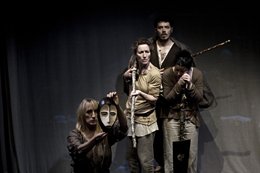Towards the end of the 1500s, in Antwerp, retired Spanish conquistador Francisco de Cuellar sat down to write, in letter form, an unbelievable story that happened to be true - of his accidental odyssey across Ireland after the Spanish Armada’s disastrous attack on England, encountering odd people and imperial armies. One imagines contemporary readers would have questioned the veracity of his tale, not only because so many of his fellow beached soldiers were promptly hanged by their obliging hosts. It’s an irrelevant point, I suppose, as history subsequently forgot about Francisco de Cuellar.
In his unadorned epic The Adventures of the Wet Señor, Donal O’Kelly resurrects the Andalucían, though retelling an incredible yarn is only part of his mission. de Cuellar crashes at Sligo’s Streedagh beach in 1588 carrying psychological baggage from colonial atrocities perpetrated in Mexico and O’Kelly imagines Ireland as a surrealistic purgatorial mire through which redemption, via music and art, can be elusively grasped.
O’Kelly and his production team realise a grand scale with limited means. The Adventures of the Wet Señor takes the audience across land and sea with a set that consists of a few chairs and some sticks. Similarly, Carrie Crowley and Sorcha Fox gleefully and seamlessly cross lines of gender, nationality and species in playing the bevy of characters that de Cuellar (Jaimie Carswell) meets. O’Kelly trusts the imagination of his audience, and receives ample support from the wonderful live music provided by four members of Kila (Dee Armstrong, Rossa Ó Snodaigh, Colm Ó Snodaigh and Seanán Brennan). There is a whimsical grandeur to their score, with touches of Spanish grace and pagan frenzy. They remain positioned behind a translucent white curtain at the rear of the set throughout the play, though Armstrong emerges on stage on occasion, most memorably to perform a beautiful interpretative dance with a white veil to evoke de Cuellar’s sinking ship.
 The Irlanda that de Cuellar stumbles upon, just a decade before The Flight of the Earls, is a boggy Babel poised for radical change. English, Irish, Spanish, French and Latin are all spoken here and languages liberally bounce off each other throughout the play’s dialogue. Carswell’s de Cueller is bumbling but brave, and though survival is his sole mission, he cannot completely avoid the hand of history, as he beds a chieftain’s wife and fights for the natives against the armies of the queen of England.
The Irlanda that de Cuellar stumbles upon, just a decade before The Flight of the Earls, is a boggy Babel poised for radical change. English, Irish, Spanish, French and Latin are all spoken here and languages liberally bounce off each other throughout the play’s dialogue. Carswell’s de Cueller is bumbling but brave, and though survival is his sole mission, he cannot completely avoid the hand of history, as he beds a chieftain’s wife and fights for the natives against the armies of the queen of England.
If there is a fault in O’Kelly’s handling of the de Cuellar epic, it is in remaining too loyal to obscure biographical material. The play was somewhat at sea during parts of the first act, as it frenetically tries to relay the confusing circumstances of de Cuellar’s imprisonment just before the Armada sank. And while the rendering of de Cuellar’s guilt for his crimes in Mexico felt heavy-handed, The Adventures of the Wet Señor becomes much more effective over the second act, as de Cuellar leaves his past behind and travels deeper into Ireland, and set pieces, like his immersion in an holy well or an encounter with Scotia weavers in Antrim, have time to develop and come to life.
Echoes of Homer and Cervantes inform the play without overwhelming it. While its tone remains mostly light-hearted and sometimes ribald, O’Kelly and technical director Tich Meagher have devised moments of genuine beauty which synch perfectly with Tom Meskell’s spartan set design, such as a red drape that is unspooled from above to represent the spilled blood of a slaughtered flutist. Carswell, Fox and Crowley, with the help of choreographer Breandán de Gallaí, also do a magnificent job in physically capturing the tumultuous world that de Cuellar passes through.
In Ireland, the story of the Armada has long passed into myth, a handy explanation for the uncommon dark beauty of many reared along the Atlantic seaboard. What good is de Cuellar’s biography to us now? The play’s greatest strength is the way it realises, through motion and music, a lost world. If de Cuellar experiences a conversion through his trials and travails in Ireland, and it is ambiguous if he does, it is a political one. We have four hundred years of history in Ireland and beyond to remind us that de Cuellar’s call to lay down arms in favour of music went unheeded. Still, it is a great pleasure to have this 16th century blow-in walking amongst us again, if only so that his strange survival tale can live on.
Donald Mahoney is a writer and journalist based in Leitrim.